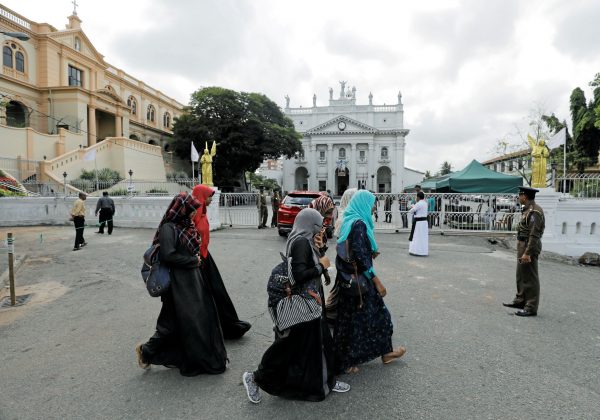The PTA is a draconian law that does not adhere to human rights standards and for decades has enabled gross violations against Sri Lankan citizens through arbitrary arrest, detention, torture and the denial of fair trial. The state — which has predominantly used the law against Tamils — began using the law against Muslims after the 2019 Easter terror attacks. The deradicalisation regulations allow law enforcement to send people who surrendered or were detained under the PTA, or emergency regulations issued after the Easter attacks, to ‘rehabilitation’.
The regulations create a new predictive style of offence based on a broad legal definition that enables the arrest and detention of citizens contrary to the procedure set out by Sri Lankan law and international human rights standards. The regulations allow investigations to commence after an arrest — depriving persons knowledge of the reason for their arrest. The subjective determination of what is deemed an offence risks the decision being influenced by personal prejudice and unconscious bias.
The regulations also violate the right to a fair trial because they allow a person to be deemed guilty and subject to rehabilitation for up to two years without trial — a decision made solely on the recommendation of Sri Lanka’s Attorney General. There is no mention of the criteria by which the decision to send a person to rehabilitation is made, nor is there information on the contents of the rehabilitation program.
The regulations are similar to those issued in 2011, which enabled persons against whom there was inadequate evidence to indict to be ‘rehabilitated’ if the government presumed they were part of the Liberation Tigers of Tamil Eelam.
Evidence that the current regulations will be used in a similar manner can be found in Sri Lankan Commissioner General of Rehabilitation Major General Darshana Hettiarachchi’s statement that even those with ‘no direct links to the 2019 April attacks will be rehabilitated’. This means that people like the young men who were arrested and detained in 2020 after being lured into a one-day training camp by Zahran Hashim (the person identified as the mastermind of the 2019 Easter bombings) are likely to be sent to rehabilitation.
Despite government claims that the regulations will deradicalise, even a cursory understanding of Sri Lankan history suggests the opposite. Anti-Muslim attacks are not new to Sri Lanka. Mutual distrust between Muslims and the state as well as distrust between Sinhalese and Muslim communities has deep roots. Following the end of the armed conflict in 2009, Sinhala–Buddhist majoritarianism fuelled by the powerful Rajapaksa family provided the backdrop for anti-Muslim acts launched by extremist Buddhist groups like the Bodu Bala Sena, many of which had government support.
Headed by former Sri Lankan prime minister Ranil Wickremesinghe, the government elected in 2015 not only failed to proactively identify and address the root causes of bigotry, it also made discrimination against Muslims publicly acceptable. Policies such as the niqab ban, as well as inaction in countering anti-minority sentiment and backlash, created a sense of impunity and emboldened sections of the public to openly engage in bigotry.
Lawyers not only refused to represent those arrested after the Easter attacks, but also tried to prevent others representing arrested persons. Senior state officials posted anti-Muslim messages on their Facebook accounts, while others circulated WhatsApp messages calling on people to boycott Muslim businesses. Many Muslim businesses in Sri Lanka’s North Western Province were instructed to leave the area, while Muslim women wearing Hijabs were refused treatment at hospitals.
Since the election of Sri Lankan President Gotabaya Rajapaksa’s government in November 2019, anti-Muslim rhetoric and action has intensified. This has been evidenced by the ban on Muslims burying their COVID-19 dead, as well as the appointment of Galagoda Aththe Gnanasara — a hardliner monk who has propagated and incited violence against Muslims — as head of the presidential task force, ‘One Country, One Law’. In this context, many Muslims say they feel abandoned by the state, an institution they view as an aggressor and potential violator of their rights.
Repressive measures that violate civic rights, perpetuate ethno-religious stereotypes and encourage racial profiling, like the new deradicalisation regulations, are likely to have limited success and ultimately act as drivers of radicalisation. They stoke rather than address the root causes of radicalisation. The PTA has been retained by successive governments with the supposed aim of making people safe by targeting so-called deviants and would-be terrorists. In reality, the PTA has demonised, marginalised and created insecurity — first for Tamils, then for Muslims and now for political dissidents.
As part of the human-rights-deficient counter-terrorism framework of the Sri Lankan state, these regulations enable the expansion of the state security apparatus and the entrenchment of arbitrary and abusive state action. Treating certain communities — many of whom live under constant siege in fear of discrimination and violence — as second-class citizens creates insecurity for all.
On 5 August 2021 the Supreme Court issued an interim order suspending the operation of the regulations, which has been extended, while it hears several fundamental rights petitions challenging the regulations.
Ambika Satkunanathan is a Fellow of the Open Society Foundations. She was previously Commissioner of the Human Rights Commission of Sri Lanka (2015-2020) and a legal consultant to the UN Office of the High Commissioner for Human Rights in Sri Lanka.

